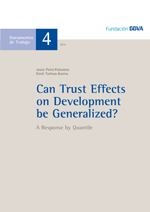The Ivie coordinates new BBVA Foundation working papers
The Ivie has coordinated working paper number 4 of 2013, published by the BBVA Foundation, Can trust effects on development be generalized?: A response by quantile. This study, along with other papers, are available on the BBVA Foundation website.
Working paper no. 4/2013: Can trust effects on development be generalized?: A response by quantile
 While the beneficial effects of social trust on economic performance have been largely recognized, we analyze whether these effects can be generalized for economies at different stages of economic development. Contrary to previous studies on this issue based on average effects (mostly considering ordinary least squares estimations), we follow a quantile regression approach that enables us to capture heterogeneous effects of trust for different development levels. By considering data for 80 countries, and using trust indicators from five different waves of the World Values Survey (WVS), our results by quantile indicate that trust is not relevant for the poorest economies, showing the existence of a social poverty trap. In addition, results suggest that the impact of trust on income decreases as an economy becomes richer. This would suggest not only that the benefits of trust cannot be generalized for all countries, as some previous studies have proposed, but also that the extent of its implications are heavily dependent on the level of development.
While the beneficial effects of social trust on economic performance have been largely recognized, we analyze whether these effects can be generalized for economies at different stages of economic development. Contrary to previous studies on this issue based on average effects (mostly considering ordinary least squares estimations), we follow a quantile regression approach that enables us to capture heterogeneous effects of trust for different development levels. By considering data for 80 countries, and using trust indicators from five different waves of the World Values Survey (WVS), our results by quantile indicate that trust is not relevant for the poorest economies, showing the existence of a social poverty trap. In addition, results suggest that the impact of trust on income decreases as an economy becomes richer. This would suggest not only that the benefits of trust cannot be generalized for all countries, as some previous studies have proposed, but also that the extent of its implications are heavily dependent on the level of development.
Authors: Jesús Peiró Palomino and Emili Tortosa-Ausina.






